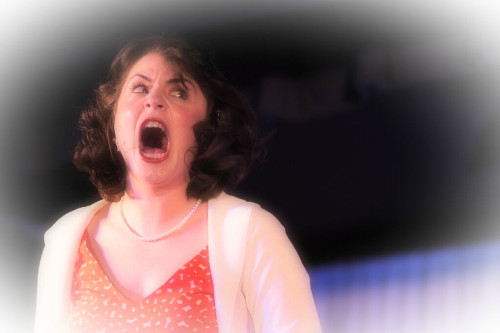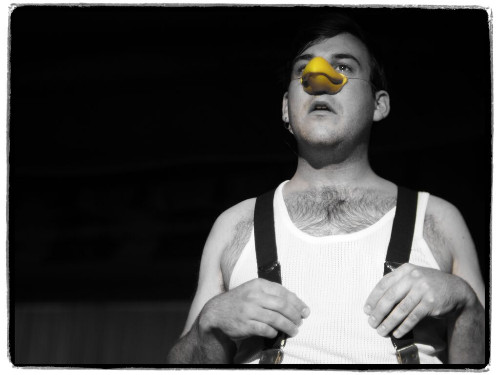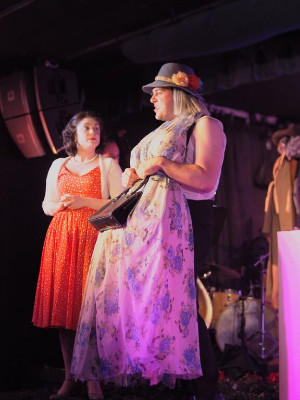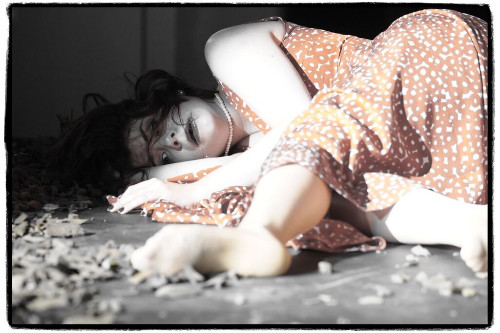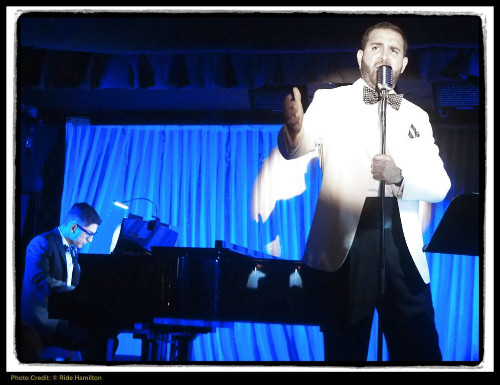Tennessee Williams Cabaret
Armando Arrocha and Colette Simple
By: Charles Giuliano - Sep 30, 2015
The Liberation of Colette Simple
Spatfeather Productions, London
Adapted from Tennessee Williams “The Case of the Crushed Petunias”
Directed by Matt Peover
Composed by Vincent Guibert
Cast: Nathalie Carrington (Ms. Colette Simple), Adam Byron (Young man, Officer, Canary and Mrs. Bland)
Canciones de Tennessee Williams
Priscila Alba, Mexico City
Directed and compiled by David Kaplan
Cast: Armando Arrocha and pianist, Mario A. Cabuto
A mandate of the Provincetown Tennessee Williams Festival is to explore all aspects of the playwright including staging new works inspired by his short stories and poetry.
It was in this spirit of invention that we settled in for an evening of cabaret at the Crown and Anchor.
Not far into the amateurish The Liberation of Colette Simple, however, our patience was soon exhausted.
While Nathalie Carrington remained in character as the ditzy Miss Colette Simple, her partner, Adam Byron, assumed a number of different roles including, this was initially less than obvious, a canary.
In the tradition of the English Music Hall, the Brits find it more entertaining than we in the Colonies, they enacted a number of skits. This was managed with quick changes of costumes and the generous use of props.
To convey a female character, for example, Byron doffed a hat with a fringe of feminine length hair, and flopped on a frumpy dress stuffed with breasts. It was less than convincing other than on terms of the broadest farce.
At some point the petunias of the Williams story came cascading down from above the stage. She scooped them up in her arms and walked about singing all the while.
Most of all the lighting proved to be downright annoying. The following spot rarely landed where it was intended. Too often it was illuminating a vacant area of the stage several feet off target.
Not that it much mattered or the attempts to solve just who stomped on her petunias. He, wearing pants and boots caked in mud, confessed.
So the “crime” was solved it seemed as she launched into histrionic mode mopping the stage to end the show.
We were astonished to see sporadic Standing O's from the audience.
I remarked on this when comparing notes with our actor friends from Albany.
“It’s a festival” he said “Everyone gets a standing ovation.”
You got that right.
Having endured that enervating performance, and by then getting past our normal bed time, we debated leaving. The second performance was to be more song based on Williams.
To our great delight Canciones de Tennessee Williams with Armando Arrocha and pianist, Mario A. Cabuto was just fabulous. Oh my, what a surprise.
It seems that the production team included lighting designer Tristan Dicincenzo, who was, well, spot on.
With a face that conveyed all of the levels of Dante’s Inferno simultaneously Arrocha, in formal attire, just gazed out at us for the longest time. He seemed to be conjuring up creative energy as well as seducing us like a Hindu snake charmer luring a cobra out of a straw basket.
Every so slowly and softly he began to sing a plaintive, evocative song.
While his voice proved to be magnificent, with an operatic range, the material was unfamiliar and sung in Spanish. Although the lyrics were lost on me the mood and emotional rendering transcended all barriers of language.
The songs were interspersed with strongly accented, dramatic readings of the poetry of Williams compiled by David Kaplan who directed this compelling performance.
As the set progressed, in the manner of the Vegas Rat Pack, he unwound. First the bow tie was abandoned. That was followed by a gradual strip tease down to his undershirt. It is a tradition of conveying to the audience that now I am getting into it and working harder and harder to move you.
It was a familiar routine which I have seen first hand over the years from Old Blue Eyes to his satellites, Sammy Davis, Jr. and Dean Martin. Perhaps most in the audience weren’t old enough to remember but in P’Town that night it worked just fine.
The poetry was wonderful and deeply felt. Two thirds of the way into the set he had us just where he wanted us.
Then the tricks happened which ratcheted it up to yet another level.
Having crooned like Russ Columbo, and evoked the range of Pavarotti, he slipped into another mode. He sat on the piano bench and engaged in a four hander with the fluid Mario A. Cabuto. They played very fast with a percussive Latin rhythm. It garnered great applause from the appreciative audience.
He exited and we speculated that the show was over. With a glittering dinner jacket thrown on over his undershirt he slipped into Mariachi mode. Behind him there was a blazing, ersatz-tacky, light show.
Again it was a genre of music and entertainment that the audience was generally unfamiliar with. It comprised a lesson in the roots of a Mexican tradition of which Arrocha is clearly a master.
We were floored to discover a great artist and consummate entertainer. Hopefully, he will become more widely known to American audiences. In addition to the poetry, however, it would have helped to have at least one song in English.
Or, perhaps, it is time for Americans to embrace Spanish as our second language.



